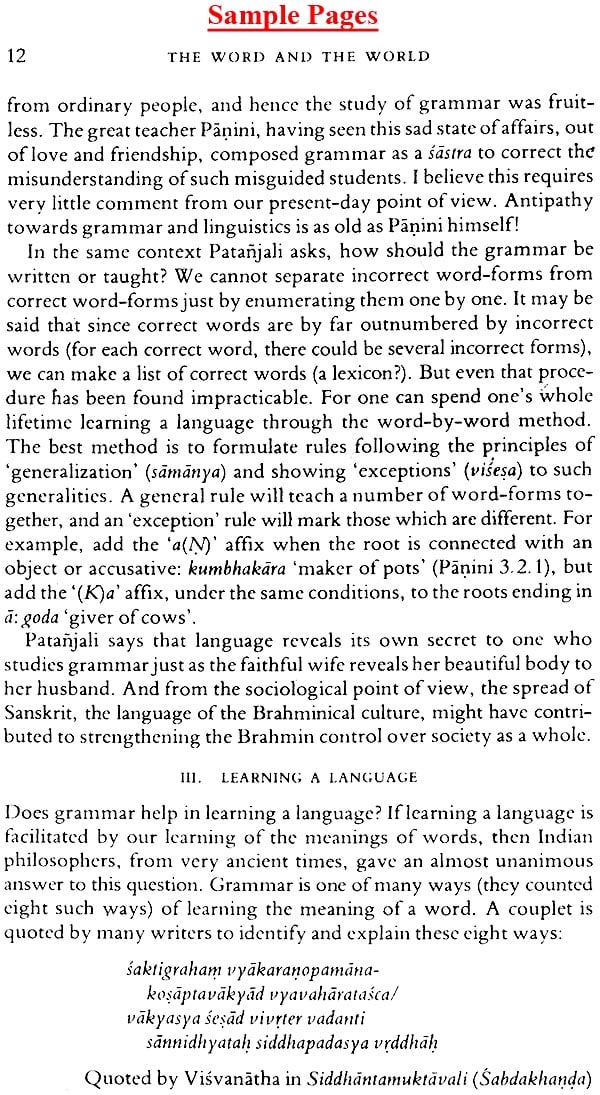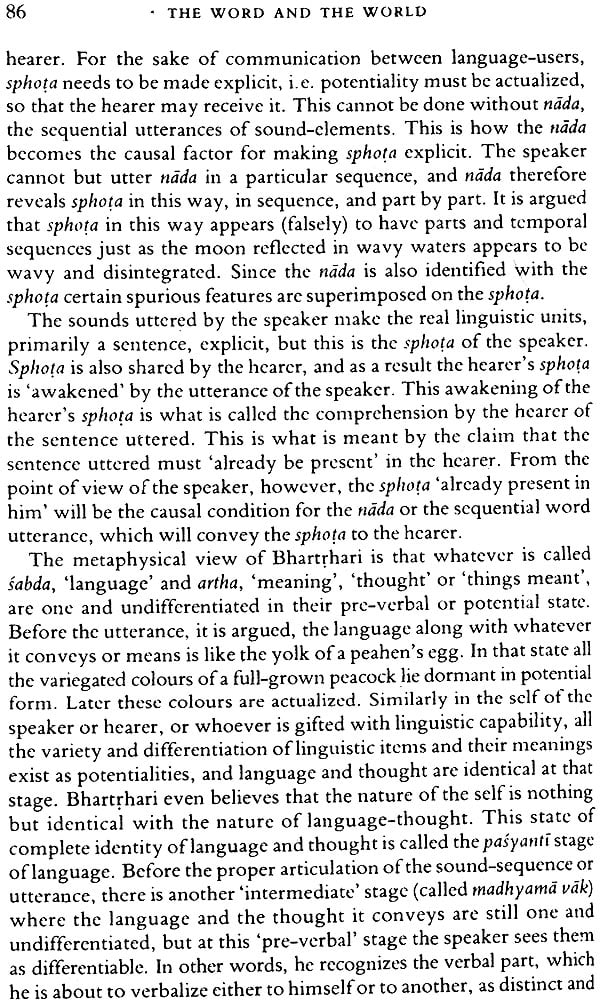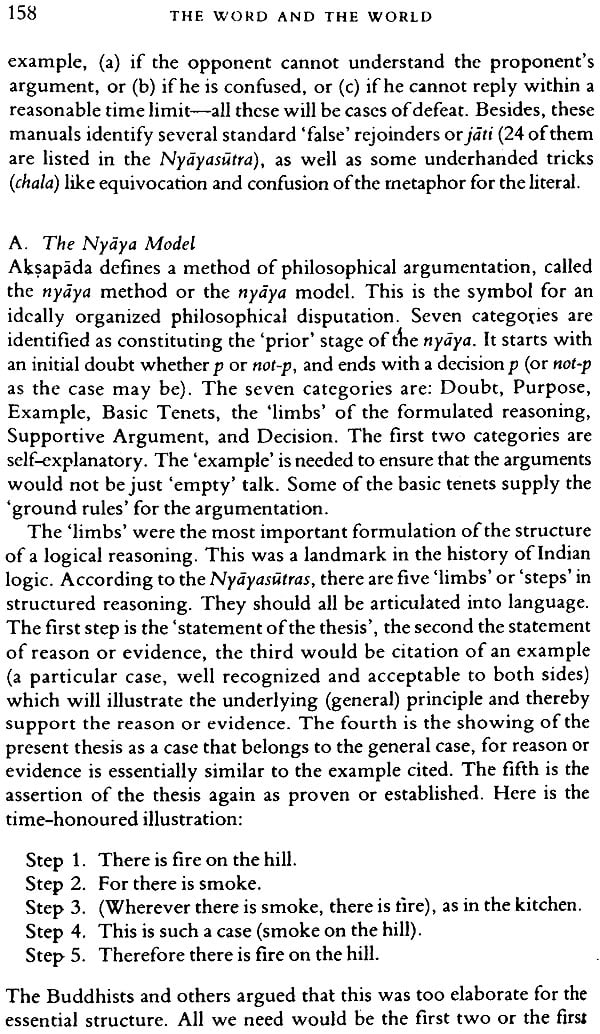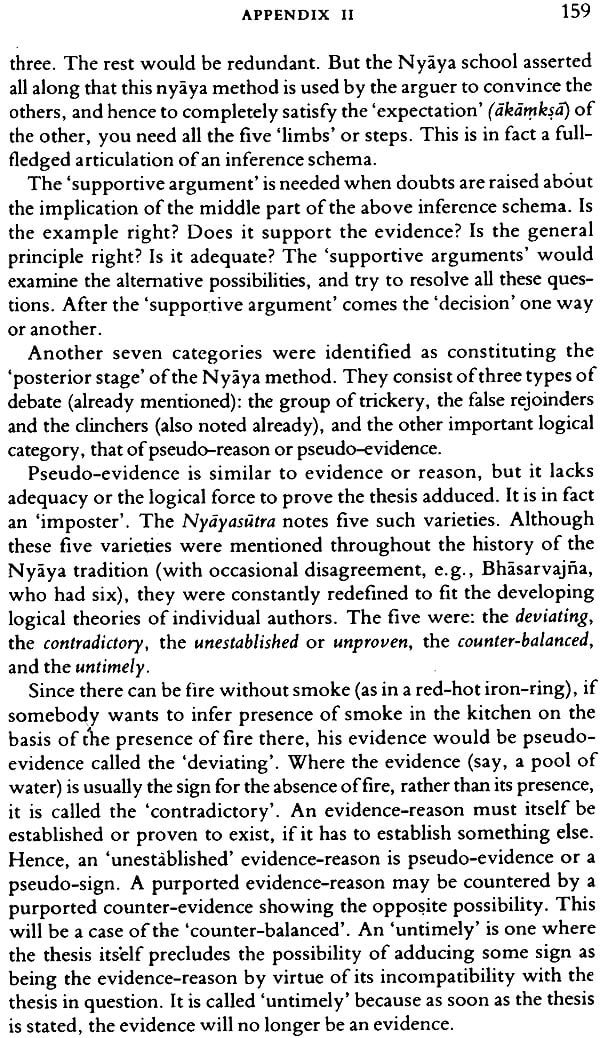
The Word and The World (India's Contribution to the Study of Language)
Book Specification
| Item Code: | NAH821 |
| Author: | Bimal Krishna Matilal |
| Publisher: | MOTILAL BANARSIDASS DELHI |
| Language: | English |
| Edition: | 2017 |
| ISBN: | 9788120841338 |
| Pages: | 204 |
| Cover: | Paperback |
| Other Details | 8.5 inch X 5.5 inch |
| Weight | 190 gm |
Book Description
This Book provides a concise yet comprehensive account of the arguments of classical Indian philosophers, Sanskrit Grammarians, and literary critics about the origins and nature of language. it also delves into the theories of meaning and the related problems of universals, the connection between the ordinary meaning and the profundity of sense in a literary composition, the question of what is sayable, and what can be shown but not said in language.
This volume lies at the meeting point of the three traditional disciplines of classical India: Darsana (Philosophy), Vyakarana ( grammar and linguistics), and Alamkara (rhetoric and literary criticism).
This book filled a lacuna in the literature on Indian philosophy and linguistics, and gave an impetus for further exploration and creative work in these fields . With a new foreword by Professor Arindam Chakrabarti, this paperback edition will be indispensable for all students of philosophy.
The idea of philosophy of grammar serving as the grammar for the rest of philosophy is older than Wittgenstein’s Philosophical Investigations. Much much Older. The nature of language as major concern and linguistic analysis as a self-conscious method took center-stage in Western philosophy only in the twentieth century. This celebrated Linguisticturn’ had happened in Classical India philosophy at least two thousand years ago. What Geometry was to the ancient India. It is not ‘what’s in a name? But What is not in a name? That would be the rhetorical questioncloser to the cultural imagination of the Indic mind. Even in the Vedic corpus monosyllabic names of the earth, the middle region and the heavens are asserted to be ontologically prior sources of the worlds they name. When, with the inspiring (and perspiring, as Gopatha Brahmana, hinting at the cosmic artis’s procreative sweat, ‘sweda’, etymologizing it as an oblique way of saying ‘su-veda’, knows well!) urge to multiply, the lonely primal person uttered those literally pregnant sounds – ‘ bhur,’ bhuvah’ ‘svah- those pronounced words brought forth their own sempiternal referents . Since then, at least for thinking humans, there is no world without the world.
Vak or Sarasvati is the most important mother goddess - one who gave birth even to her Father – of the Vedic philosopher because in her wordy watery womb both thoughts and things, meanings and meaning – and meaning bearing signs are conceived. Perhaps that is why, when we permit another dominant culture to take our speech or word away, we have effectively let them take our world as well.
In this monograph I deal with what is today called 'philosophy of language' 011 the basis of an analysis of materials drawn exclusively from the writings of classical Indian philosophers. Both lndological scholars and modern philosophers will find here something to interest them. Students of linguistics, whether in India or elsewhere, will also benefit from a careful study of the issues and problems discussed here. While I have avoided facile comparison with any modern view and let the texts speak for themselves, I have tried to make my pre- sentation clear, concise and at the same time comprehensive. What is given here is, in short, not simply an exposition but also J critical analysis of the classical theories.
A brief account of how I came to write this monograph n1.ly be in order here. A few years ago, I was invited by the Director of the Central institute of Indian Languages at Mysore (Manasagangotri), India, to give a seminar on Indian theories of semantics, while the Institute was acting as host to an international Conference on Semiotics. I presented the sphota doctrine along with some other issues discussed by the grammarians and philosophers of classical India. The audience consisted of scholars and students generally from the field of modern linguistics, and most of them were non-Sanskritists. They found my presentation not only intelligible but also of absorbing interest because, as it was remarked by one participant, none of the available books in English on the subject made the discussion accessible to non-Sanskririst linguists or philosophers. A book to fill this need would be welcome.
Although philosophy of language has a very long and rich tradition in classical India (since it was connected with extensive study of Sanskrit grammar) comprehensive survey of the literature from a modern point of view is still lacking. Several good monograph are available dealing with some particular aspects or some particular authors. For example, of the modern authors, four at least deserve mention: Gaurinath Sastri; Bishnupada Bhattacharya, K. Kunjur.ni Raja and K. Subrahmania Iyer. What they have written is philosophically interesting. But while Sastri and lyer arc exclusively concerned with one author-s-Bhartrhari (Iyer's study of Bhartrhari is very valuable), Bhattacharya covers the area of dispute between the Vaiyakaranas and the Naiyayikas. Raja gives a somewhat comprehensive survey, but he seldom provides adequate analysis of the views he refers to. M. Biardeau's monograph on Bhartrhari is illuminating, but her approach is decidedly different from mine as well as from that of many others. S. D. joshi's and G. Cardona's persistent study of the Paninian school of grammar has been very helpful and philologically sound. However, the present monograph attempts to strike a new course, as I have emphasized already.
The book is divided into two parts: one deals with the general issues and problems and presents a concise survey; the other picks out several special topics for analysis and discussion. In Part I, the problem of universals (chapter 4) defines one end of the parameter of what is understood by philosophy of language in India, and the karaka theory (chapter 5) defines the other end of the parameter. Another important issue is why and how we derive knowledge from linguistic utterances. This is actually connected with the broader philosophical problem: the epistemology of testimony. A certain amount of interest in this problem has been recently visible among some modern analytical philosophers. There is little scope here to discuss the problem with all its implications, and chapter 6 provides only a synoptic view. A project is in progress to prepare an anthology on this very important topic, in which classical arguments will be examined vis-a-vis the discussion and arguments of modern philosophers. It is, however, difficult to say at this stage, to what extent this attempt will be successful.
The first three chapters of Part 11 focus upon the sphota theory, which is recognized in some quarters as a unique contribution of the Sanskrit grammarians to the global philosophy of language. I have tried to give prominence to Bhartrhari's view, separating it from that of the former and the later grammarians. Chapter 10 deals with an important issue which caused prolonged controversy among different schools of Indian philosophers, and some parts of the discussion are reminiscent of the modern problem about G. Frege's Context Principle. (Professor P. K. Sen and the present author wrote an article in a comparative vein, which appeared in Mind, January 1988. Interested readers are requested to consult the article.) Chapter 11 deals with the problem of translation vis-a-vis Bhartrhari's holistic view of language. It occasionally refers to a few lines from). Derrida's On Grammatology and the dispute over the primacy of the scripric over the sonic (e.g. logocentrism) in linguistics. The reason for this sudden reference to Derrida is historical: part of the chapter was written as a paper for a seminar organized by J. Derrida and his colleagues. Chapter 12 is an elaboration of Bhartrhari's view of cognition.
If philosophy is an attempt to understand the world around us, as it is revealed in our ordinary and not so ordinary experiences, and if it is in terms of our language that we apprehend the world, then an under- standing of how our language works would be almost the first step in studying philosophy. But perhaps this is demanding too much, even if we grant both of these antecedent conditions. It may be that we understand the world in terms of our language, and this would imply that our thinking about the world necessarily involves the use of language. Philosophy (contrary to the famous pronouncement of Wittgenstein which still has a strong hold among modern philosophers) may not always be thought of as being concerned with rectifying the misunderstanding we have of our own concepts, or of our own language (the curing of the 'bcwitchment' of our intellect by language). For a long time in the West, philosophy was thought to be concerned with the established truths of a very general kind, with metaphysics and ethics. with other truths to be arrived at through the power of reasoning. In this scheme. philosophy of language occupied no important place. Since Descartes, it was noticed that the starting point of the subject was epistemology. Later, in the post-Fregean period. some analytical philosophers believed that 'philosophy of language' in a specific sense should constitute the starting point of philosophical studies.
Human language is a very complex phenomenon. But its supreme relevance lies in the recognition of the fact that thinking is almost impossible without language, and hence by analysing language we can analyse thought. Our thoughts are communicable by means of language. This is not an accidental connection. We use language to communicate thoughts because we have an implicit understanding of how our language works. These principles governing the use of language are shared. though implicitly, by all language-users. In fact, in our sense, language and thought may be simply indistinguishable. One modern philosopher, Dummett (1980,442), who firmly believes that the philosophy of Language is 'the base of the entire structure' we call 'philosophy', argues that there is a very general aspect of our concern with language and this concern is with the fundamental outlines of an account of how language functions-it is in this sense that the philosophy of language is to be regarded as the foundation of all the rest in philosophy. This overall concern with how our language works was not the chief concern of most classical Indian philosophers, except for the grammarians like Bhartrhari. Thus, with Bhartrhari and all post-Bhartrhari grammarians, language acquired a metaphysical importance. Although Bhartrhari sometimes asked questions similar to those of post-Fregean philosophers, what he supplied as answers may not engage the attention of modern analytical philosophers. Hence we must conclude that the basic attitude as well as the conclusion was very different, as far as classical India was concerned.
When we talk about Indian philosophy of language we must take a slightly different approach. In a specific sense, the philosophy of language was part of Indian philosophical activity from the beginning of its history. One reason was to recognize the Scriptures' (Vedas') authority in certain areas of our belief system. The Indians do not always talk about 'revelation' in the way it is understood in the Judaeo- Christian tradition. The Scriptures were regarded by tradition as embodying certain truths derived from the supposedly 'revealed' insights of the sages called 'seers' (= rsi). Veda thus means a body of knowledge, in fact, a source or 'means' of knowledge. The Scriptures are in fact a body of statements. This linguistic nature of the Scriptures (in the case of the Buddhists, the dialogues of the Buddha fulfil the same purpose, and the same is true of Jainism and Mahavira) reveals gradually the fact that language or 'verbal testimony' is an important source of knowledge, like perception and inference. This has led to the general inquiry about how a bit of Ianguage, a word or a sentence, imparts knowledge to the hearer. Therefore, what we call the philosophy of language in India has always formed a part of the classical philosophers' general epistemological inquiry, part of the pramanasastra, the theory of evidencc' for belief or knowledge. The question was: how does a linguistic utterance, through the communication of its meaning, impart knowledge to the hearer? For it is observed that not simply the Scriptural statements but also any ordinary statement can and does impart knowledge. Strictly speaking, most of our knowledge today is derived from reading and listening, hence we can say that it is linguistically communicated. In particular, however. analysis of sentences and words into significant components, the relationship between word and meaning, classification of words according to semantic contribution, division of words with reference to the division of ontological categories, logical and psychological factors in knowing the meaning of a sentence, philosophical significance of grammatical analysis, and principles of linguistics-all these haw been repeatedly discussed by the philosophers in India over the centuries. This discussion constitutes the vast amount of writing which we can very profitably explore to talk about the classical Indian philosophy of language. In this book we shall adopt this line of research. As the list of topics (some of them have been mentioned above) is rather vast, it would be difficult to provide an exhaustive account. I shalt aim at limited comprehensiveness, focusing my attention upon certain particular issues.
Writing in 1969 on 'Sanskrit Philosophy of Language' F. Staal commented that 'at times almost excessive preoccupation with language on the one hand and with philosophy on the other, may indeed be regarded as a characteristic of Indian civilisation' (Staal, 1 %9, 4(3). What Staal has called 'Sanskrit philosophy of language' in his survey of the modern research in this field is almost identical with what I wish to call Indian philosophy of language. For, to be sure, it refers to the various views and controversies surrounding the nature of language and meaning as well as the method of language acquisition put forward by Indian philosophers (although they all wrote in Sanskrit).
Contents
| Preface | xi | |
| PART I: GENERAL STUDIES | ||
| 1 | Introduction | 3 |
| 2 | On Grammar and Linguistic Studies | 7 |
| 3 | Words and Their Meanings | 18 |
| 4 | Names and Things: Universals | 31 |
| 5 | The Kdraka Theory | 40 |
| 6 | Knowledge from Linguistic Utterance | 49 |
| | ||
| 7 | The Sphota Theory: Early History and Patanjali's View | 77 |
| 8 | Bhartrhari's View of Sphota | 84 |
| 9 | Critics of the Sphota Theory and Views of Later Grammarians | 99 |
| 10 | Words vs. Sentences | 106 |
| 11 | Translation and Bhartrhari's Concept of Language (Sabda) | 120 |
| 12 | Cognition and Language | 133 |
| Appendices | ||
| I | Mysticism and Ineffability: Some Issues of Logic and Language | 142 |
| II | Semiotic Conceptions in the Indian Theory of Argumentation | 156 |
| III | Meaning in Literary Criticism: Vakrokti and Dhvani | 167 |
| Bibliography | 180 | |
| Index | 185 |










